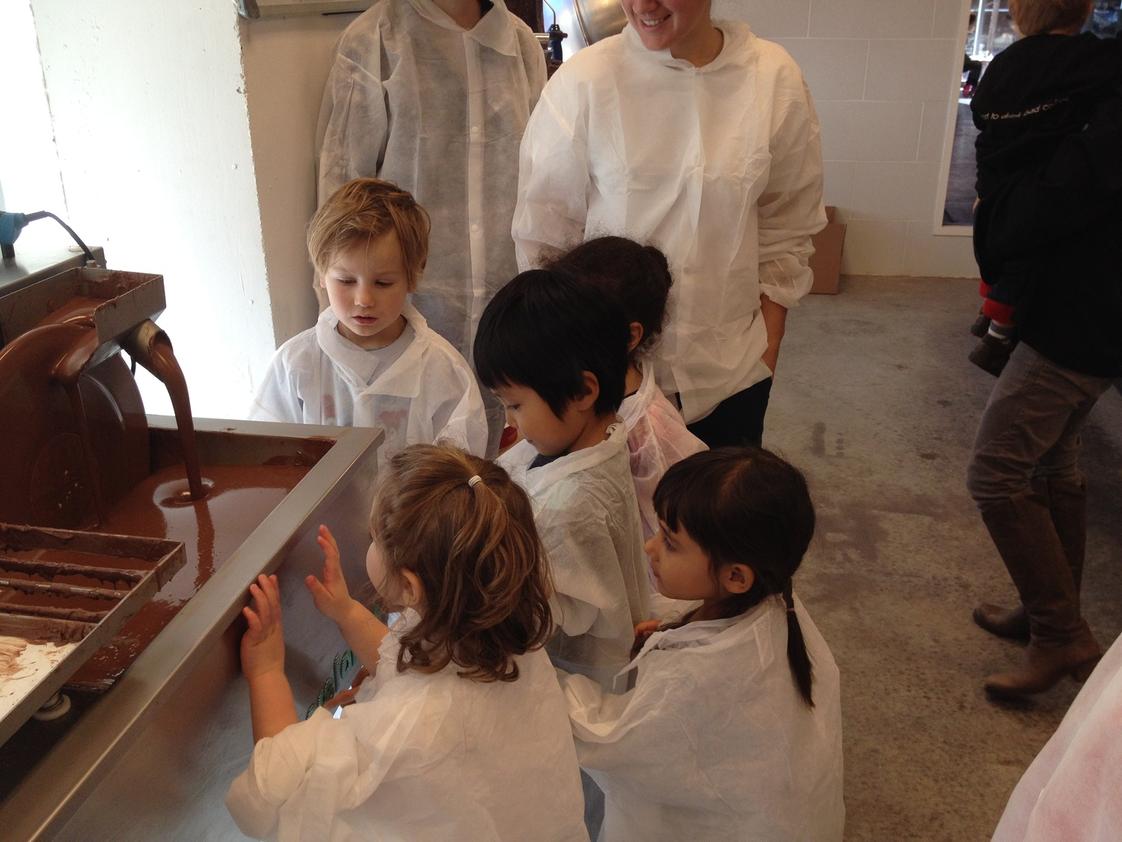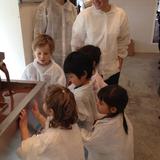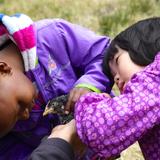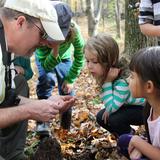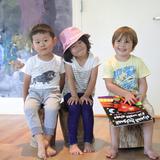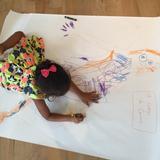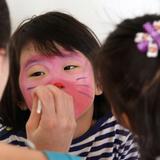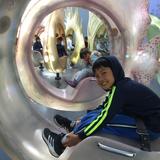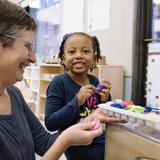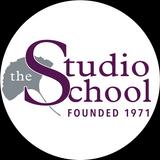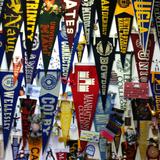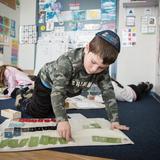Pono's educational program was founded in 2010 by a parent, educator, and education researcher in response to the need for an alternative school option that protects children's innate curiosity, genius, wonderment, and drive to explore and grow, by trusting them to initiate and direct their own learning.
Pono is a pioneer in offering an educational program that is both outdoor and democratic: a program where the children spend at least half of their time out of the classroom in and around New York City.
Students design the curriculum through a process that respects and reflects their varied individual learning interests, and they govern their learning community through a democratic process.
They pursue topics and long-term projects in fields as diverse as natural sciences (including biology, chemistry, Earth science, and physics), history, creative movement and dance, foreign languages (e.g., Spanish, Japanese, and Arabic), gardening, health and nutrition, cooking, reading, art, yoga, music, charity, fashion design, carpentry, sports, and more.
Pono is the only outdoor democratic school in New York. We plan to grow with the oldest group and expand through high school.
School Overview
School Type
Grades Offered
Grades Nursery/Preschool-8
Year Founded
2010
Summer School Offered
Yes
Summer Program Details
Student Body
Total Students
21 students
Student Body Type
Co-ed
Students by Grade

Academics and Faculty
Total Classroom Teachers
4 teachers
Student : Teacher Ratio
5:1
National avg.: 13:1
% Faculty w/Advanced Degree
75%
Average Class Size
7 students
Matriculation DataMatric. Data
Classroom Dress Code
Casual
Tuition and Acceptance Rate
Admission Deadline
None / Rolling
Yearly Tuition Cost
$29,740
Tuition Notes
Full tuition for 2020–2021 is $29,740 for ages 5 and younger, and $31,200 for older children. Part time enrollment is prorated based on the number of days selected. A 10% siblings’ discount is offered.
Summer Program Cost
$5,360
Summer Program Cost Notes
Summer camp enrollment is also available on a weekly basis, at $710/week.
Admissions Director
Kate Deshmukh
Extracurriculars
Total ExtracurricularsTotal Extra-curric.
3 extracurriculars
ExtracurricularsExtra-curric.
Club or Organization:
Extended Day Program
Arts and Music Programs:
Art Classes
Recreational Athletic Programs:
Soccer Club
Extended Day Program
Arts and Music Programs:
Art Classes
Recreational Athletic Programs:
Soccer Club
School Notes
Mission
- Pono offers school-age children anindependent,democratic, andoutdooreducational program where each child`s interests and innate desire to learn are cherished and nurtured as the children are immersed in a harmonious learning community and authentic world learning environment, and guided to becoming life-long thinkers and balanced human beings.
- Children are learning creatureswho are naturally curious and inquisitive, and who strive for understanding and competence. We support their basic human drive to learn and grow by providing the opportunity to direct and regulate their learning in the manner that they choose, at their own place and pace, and for as long as they want and need. The structure at Pono-whether it isvoluntary classes; mixed age groupings; the absence of a pre-set curriculum, homework, tests, and grades-contributes to a fulfilling and enjoyable learning experience;
- Children, no matter how young, learn responsibilityby being given responsibility. Children at Pono have the responsibility and freedom to govern not only their learning, but also their own Pono community. Each child and teacher has an equal voice in decisions that affect the daily operation of the educational program;
- A healthy environment is one in whichPonoexists.Pono, a traditional Hawaiian concept denoting perfect harmony and equilibrium, inspires everything we do.We strive to create a learning environment of perfect harmony with our children, families, teachers, and other members of the Pono community. We make every effort to have our lessons, meals, programs and projects achieve a state ofPonoamong our community, bigger society, and nature;
- Learning happenseverywhere, and it happensbest when children are immersed in authentic environments and situations, rather than through rote or forced instruction in rigid artificial settings. We take full advantage of the riches and resources available in New York City and the surrounding states. We hold many sessions in parks and farms, museums,factories, workshops,theaters, art studios and so on. We create partnerships with different educational and cultural organizations to provide and facilitate access to different events and resources. At least twice a week we invitevisiting teacherswho are professionals and educators specialized in fields that correspond to the children's interests to work with them.While the learning environment we create is natural,unwired,open-ended,dynamic, andflexible, it always adapts and adjusts to the interests of the students;
- Children and adults learn together and from each other, despite presumed or identified abilities, disabilities, challenges, and labels.All members of the Pono community work together on creating a fully inclusive learning environmentthat is free of attitudinal, structural and physical barriers that would hinder the full participation of its members in the community;
- The role of teachers is to nurture, guide, and supportthe interests and natural progress of the children. More importantly, they teach by example how to be socially conscious; how to pursue learning journeys; and how to live harmoniously in a community where one`s freedom ends when it interferes with the freedom of others.Ourhigh teacher to child ratioandsmall-size groupsensure that each child gets the individual guidance and support she needs.
- At Pono, personal development and participation in a community ofkindness, respect, and inclusion are essential. In our daily operation, we valuefreedomnot license,collaborationnot competition, resolving conflict throughcouncil meetingsnot punishment.
Source: Verified school update
Frequently Asked Questions
How much does Pono cost?
Pono's tuition is approximately $29,740 for private students and $5,360 for summer students.
Does Pono offer a summer program?
Yes, Pono offers a summer program. Visit their summer school page for more information.
When is the application deadline for Pono?
The application deadline for Pono is rolling (applications are reviewed as they are received year-round).
Recent Articles

A Parent's Guide To Understanding High School Teaching Methods
This comprehensive guide helps parents navigate the various teaching methods used in today's high school classrooms. By understanding these approaches, you'll be better equipped to support your teen's learning journey, communicate effectively with teachers, and create a complementary learning environment at home.

February 08, 2025
Social Emotional Learning: Education's Hidden SymphonyA musician's perspective on Social Emotional Learning reveals how this educational framework orchestrates success through five essential emotional competencies.

January 24, 2025
A Roadmap For Starting A Private SchoolUse this roadmap as a set of talking points with your trusted mentors and professionals to start the private school of your dreams. You're not alone. Over the years, hundreds of folks like you have had the same dream. From Quintilian to Maria Montessori to Lucy Madeira Wing, visionary educators have established schools to teach according to their beliefs and methodologies.


